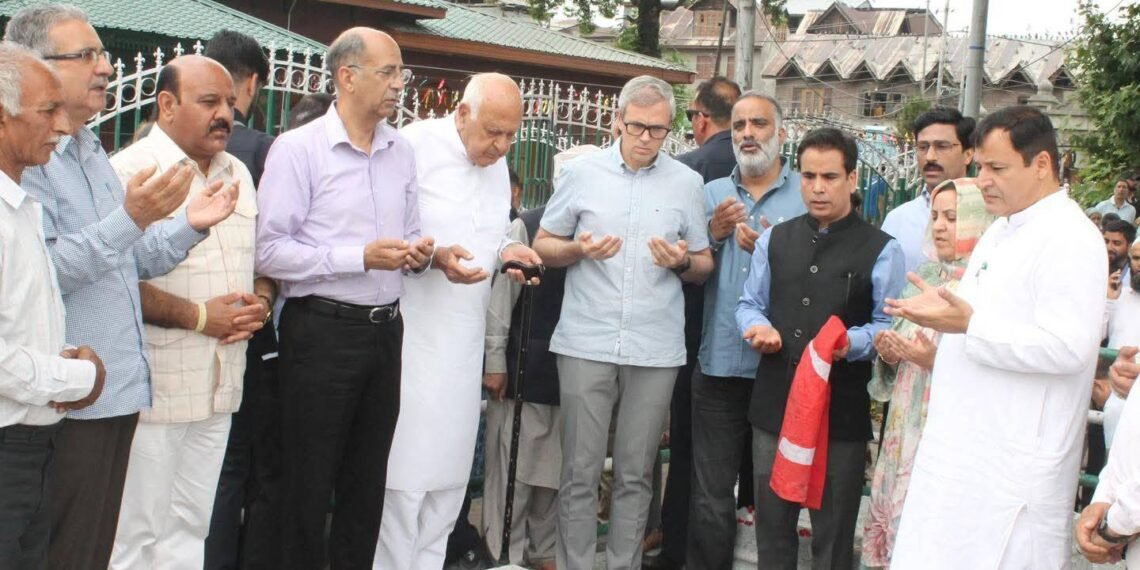The unelected government tried to block my way, forcing me to walk from Nawhatta Chowk. They blocked the gate to Naqshband Sb shrine, forcing me to scale a wall.
By Pravin Kumar
In a dramatic display of defiance against administrative restrictions, Jammu and Kashmir Chief Minister Omar Abdullah Monday scaled a wall and evaded security personnel to pay his respects at the Martyrs’ Graveyard at Naqshband Sahib near Nowhatta Chowk in Srinagar.
The visit was to commemorate the 94th anniversary of the 1931 massacre, observed as Martyrs’ Day.
Later, Omar Abdullah took to social media to share his ordeal, stating, “Paid my respects & offered Fatiha at the graves of the martyrs of 13th July 1931.
The unelected government tried to block my way, forcing me to walk from Nawhatta Chowk. They blocked the gate to Naqshband Sb shrine, forcing me to scale a wall. They tried to physically grapple me, but I was not going to be stopped today.”
His actions followed a stringent clampdown by the Jammu and Kashmir administration, which had denied permission to political parties, including the ruling NC, to visit the Mazar-e-Shuhada at Naqshband Sahib to pay homage on Sunday.
The Srinagar district administration, under the control of the Centre-appointed Lieutenant Governor Manoj Sinha, issued a public advisory on July 12, 2025, stating, “The District Administration Srinagar has denied permission to all applicants intending to proceed towards Khawaja Bazar, Nowhatta on 13th July 2025 (Sunday).” Roads leading to the graveyard were sealed with barricades, and a heavy deployment of police and Central Armed Police Forces (CAPF) was reported across Srinagar, particularly around Khawaja Bazar. A popular Sunday flea market in the nearby Lal Chowk area was also canceled as part of the restrictions.
READ: AI171 Report Finds No Tech Faults, Air India CEO Confirms
The clampdown extended to several political leaders, with many, including NC president Farooq Abdullah, Peoples Democratic Party (PDP) chief Mehbooba Mufti, and Hurriyat Conference chairman Mirwaiz Umar Farooq, claiming they were placed under house arrest to prevent them from visiting the graveyard.
Mufti posted images on X showing her gate padlocked, writing, “When you lay siege to the Martyrs’ Graveyard, lock people in their homes to prevent them from visiting Mazar-e-Shuhada, it speaks volumes. July 13th commemorates our martyrs, those who rose against tyranny, much like countless others across the country.” She further argued that true reconciliation between Delhi and Kashmir would only occur when India recognizes Kashmiri martyrs alongside national heroes like Mahatma Gandhi and Bhagat Singh.
Read: UFO Collision With F-16 Sparks Airspace Security Debate
Abdullah’s comparison of the 1931 massacre to the Jallianwala Bagh tragedy sparked controversy, with the Bharatiya Janata Party (BJP) accusing him of “glorifying rioters” and attempting to “rewrite history.” A BJP spokesperson claimed the 1931 uprising, led by figures like Abdul Qadeer, was an act of “Islamist violence” and criticized Abdullah for equating it with the 1919 Jallianwala Bagh massacre. In response, NC spokesperson Ifra Jan defended the party’s stance, accusing the BJP of undermining the elected government and strengthening “unelected powers” in the region.
ALSO READ:https://powercorridors.in/a-thrilling-day-5-awaits-can-india-pull-off-a-historic-chase-at-lords/
The restrictions have drawn widespread condemnation from political leaders across party lines, who termed the administration’s actions “blatantly undemocratic.” Nasir Aslam Wani, advisor to the Chief Minister, posted on X, “Today we pay homage to the brave martyrs of 13th July 1931, valiant sons of the soil who laid down their lives against tyranny and oppression. Their supreme sacrifice sparked a movement for justice, dignity, and democratic rights in Jammu and Kashmir.”
Other leaders, including JKAP president Bukhari and M Y Tarigami, echoed similar sentiments, with Tarigami noting, “A padlock on my gate, placed under house arrest and denied the right to pay homage to the July 13 martyrs. This day is etched in our collective memory”, he added.














